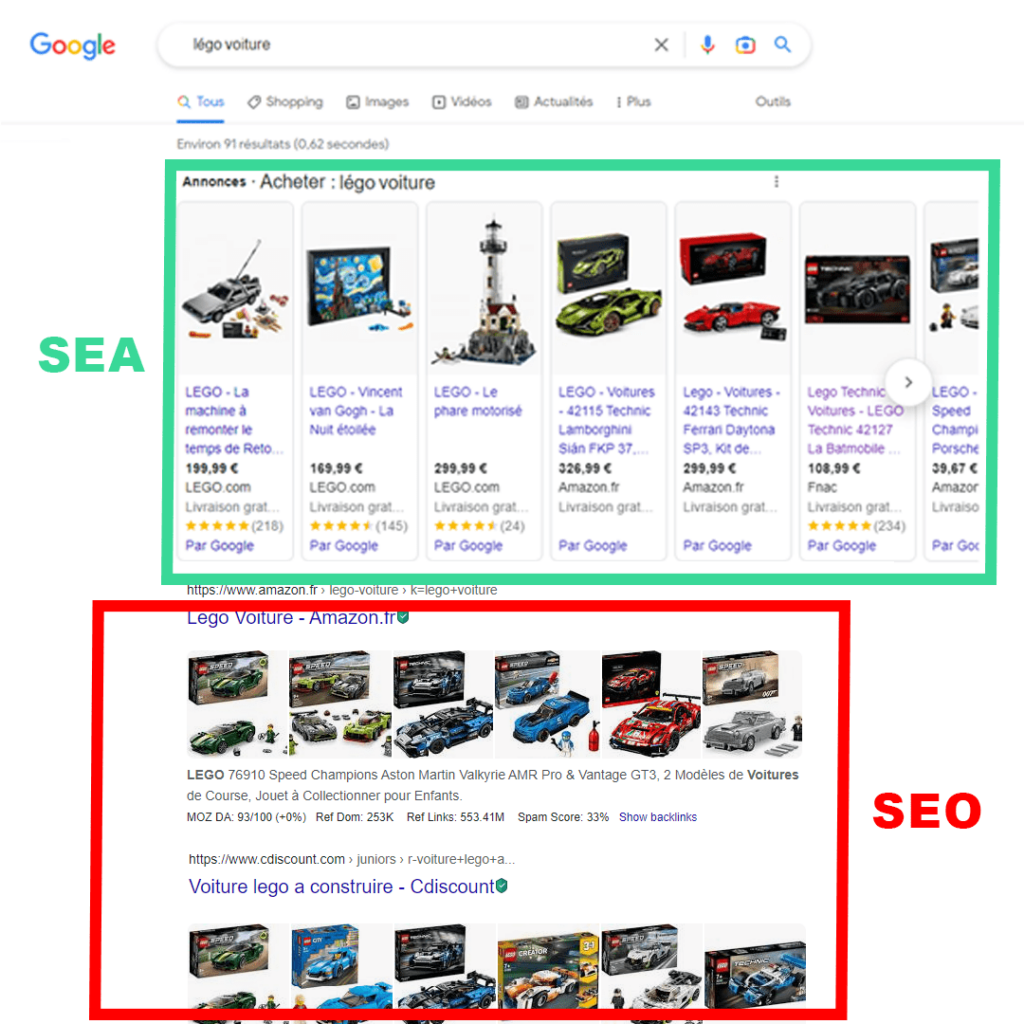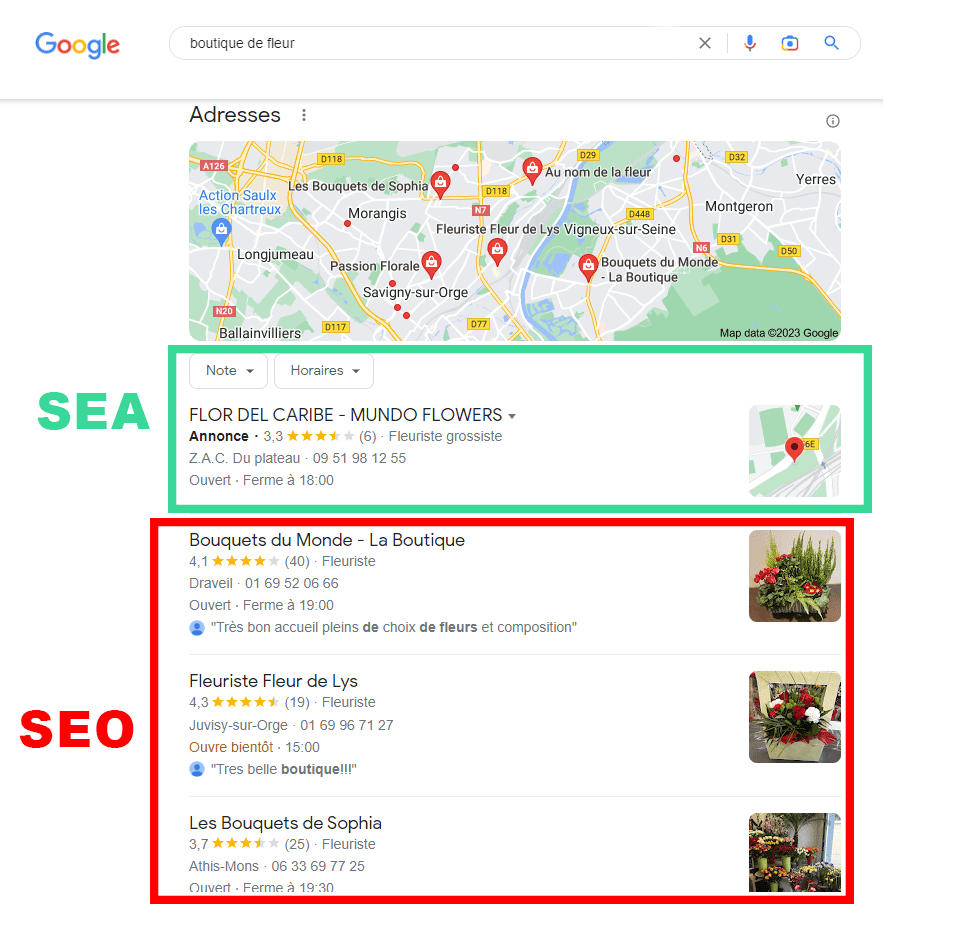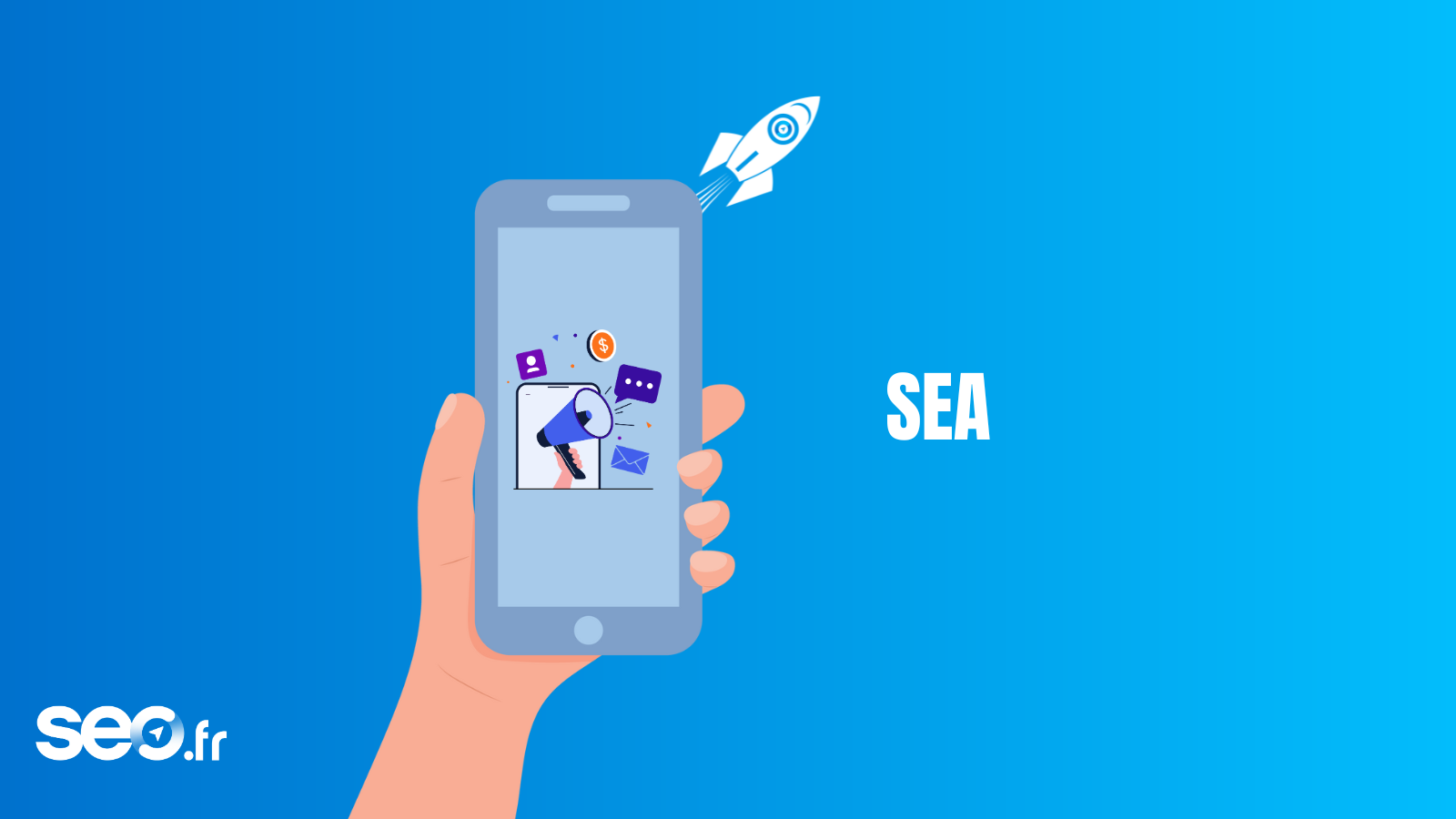Definition of SEA (paid search)
When you want to raise the profile and visibility of a site, web marketing is essential. One of the things you need to do is search engine optimization (SEO). And paid search (SEA), as distinct from natural search (SEO), is often the starting point for a good digital strategy. 63,000 queries per second are made on Google, that’s more than 5 billion per day.
Imagine your company being promoted by the ads on this fantastic search engine. Tempting, isn’t it? But you still need to know how to go about it.
When you want to raise the profile of a site, you need to look at its SEO. There are two main strategies: natural referencing or SEO (Search Engine Optimization) and paid referencing or SEA (Search Engine Advertising).
SEA allows you to position yourself visibly on the most searched-for terms. On Google, you use the Google Ads interface, formerly Google Adwords.
SEA or paid search: what is it?
SEA is the acronym for Search Engine Advertising, and is one of the best ways of achieving rapid positioning on targeted keywords and generating traffic. SEA is a system that aims to place an advertisement in a prominent position on search engines, in the paid section. On Google, we use Google Ads, formerly Google Adwords, to position ourselves on search terms and improve visibility.
SEA stands for Search Engine Advertising. It’s a targeted but lucrative service.
The aim is to place an advertisement in a prominent position on the search results page (SERP), in the paid section.
SEA: Presence-Visibility-Notoriety
Once a site has been created and put online, it has a presence on the web. The pages of a site may be present on the web, but not in the search engine results (SERP). In this case, they are not indexed. Getting your site indexed is the basis for acquiring traffic, which will give you greater visibility. After that, you can start working on your natural referencing (organic traffic). This involves making your pages appear higher up on Google, Bing, etc. on specific terms.
Paid search is not exactly the same thing. The page to be placed must be online, but it does not need to be indexed in order to set up an advertising campaign.
The whole SEA web strategy starts with defining the keywords you want to rank for. This is the foundation for everything that follows. If it’s unstable and badly done, you won’t get any interesting results. This underlines the importance of defining the list of keywords you want to rank for. To be effective, your expressions must have potential, i.e. be searched for by Internet users. The products or services you offer must also correspond to the expectations of this keyword. Only then will you be able to create your advert.
Once you’ve defined the expressions that will ensure your visibility, it’s time to create your ad. This will be created according to your objectives, your target and your landing page. This is the starting point from which you will work to achieve your objectives. Defining a keyword strategy and budget will ensure your visibility, but the creation of the ad and everything that happens from the moment you land on the chosen page is designed to bring you notoriety. This is where your branding begins.
What are the objectives of SEA?
- Generate targeted traffic: thanks to sponsored links, which are placed above natural links.
- Increase your visibility: SEA is a very powerful way of improving the visibility of a company, brand or product in an already competitive market.
- Increase sales: with highly qualified traffic that expresses buying intentions from a simple search.
Advertisements can be created in the form of commercial links or advertising banners. Advertisers pay search engines a fee each time a user clicks on their ad. This is called the cost per click (CPC).
Do you have a SEA question?
Julia can help
7 years’ expertise in SEA

The advantages of paid search
If you have decided to use paid search to increase the visibility of your site, here are some key points to bear in mind:
- Rapid visibility for your site: paid search engine optimization (SEO) enables your site to be placed quickly in the search engine results, unlike natural search engine optimization (SEO). This is the most recommended option if you want to achieve significant results in a short space of time.
- A complement to natural referencing: Paid referencing makes it easier for you to reach a particular target, especially by using different marketing techniques. SEA will often enable you to kick-start your natural referencing campaign and support it from time to time.
- Real-time control: with paid search, you can modify and adjust your ad and your budget in real time. Budgets are generally affordable (with some exceptions).

How does paid search work?
SEA is not just about paying for visibility. To be effective, it requires solid technical knowledge. A specialist will be able to define a clear and precise strategy based on your objectives.
- Drawing up a budget
You set the maximum daily budget you want to spend, then pay when someone clicks on one of your ads. Links are billed on a cost-per-click (CPC) basis.
- Select keywords
This is the basis of SEA web strategy. Your expressions must have potential: they must be searched for by Internet users. The products or services you offer must also match the expectations of these keywords.
- Writing content for commercial links
Search engines take their quality into account, and your positioning can benefit from it. It should be written with your objectives, your target audience and your landing page in mind. A short, punchy advert will encourage visitors to click on your link.
Defining a keyword strategy and budget ensures visibility. The creation of the publication and everything that follows from landing on the chosen page bring notoriety.
You can do all these steps yourself, but it’s better to call in a professional, an SEA agency or SEO, who will be able to optimize your digital marketing strategy.

This method is particularly suited to new sites that have no organic positioning and want to overtake their competitors quickly. But that’s not all…
Paid search: a highly attractive marketing tool
Here are a few examples of situations that require the use of an SEA campaign:
- You have just set up your company;
- You are launching a new product;
- You want to raise your profile;
- You have lost positions in the SERP;
- You need occasional help with a seasonal activity;
- etc.
Sponsored links are placed at the top of the search results with the word “Ad” in bold. You can therefore be sure that Internet users will be receptive to them.
Finally, this method offers excellent value for money compared with other forms of advertising.
The need for SEA for e-commerce sites
For an e-commerce site, SEA is the most effective way of ensuring rapid positioning on defined keywords and generating qualified traffic.
You can get an overview of your customer base:
- Geographical area ;
- Type of device used;
- Interests;
- New or existing customers;
Plus: you can do almost anything to personalize your ads. Result: qualified traffic and a better conversion rate!
SEA and SEO: combining them intelligently
SEA and SEO are mutually enriching, and you can combine them to increase the power of your marketing strategy and achieve successful operations.
Buying keywords on a temporary basis can be an opportunity to raise your profile, gain visibility and brand awareness and, of course, drive qualified traffic to your website.
6 good reasons to implement an SEA strategy
- Advantageous positioning
What link do you click on when you do a web search? Very few Internet users go further than the first results.
- Immediate visibility
Your site is positioned immediately, and your visibility is guaranteed for the duration of the campaign.
- Precision targeting
Around 30% of Internet users click on sponsored links following their search.
- Controlling your budget
When you set up your SEA campaign, you directly define the budget you wish to allocate to it.
- A complement to natural referencing
SEA will often enable you to kick-start your SEO campaign and support it from time to time.
- Real-time control
Modify and adjust your ad and your budget in real time.
To find out more about paid search, visit the Google Ads definition.
Do you know the differences between SEM, SEO, SEA and SMO?









